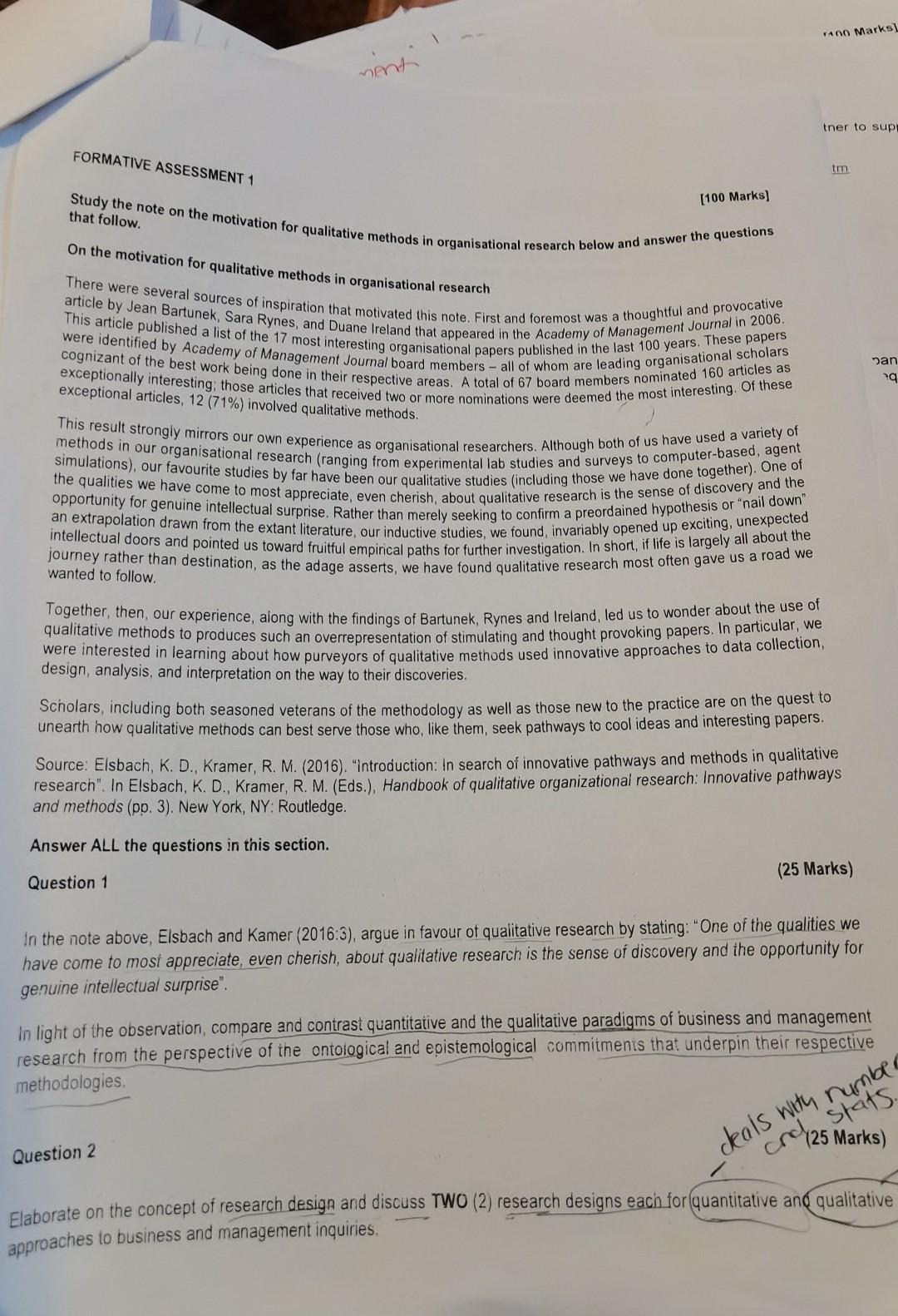Answered step by step
Verified Expert Solution
Question
1 Approved Answer
please kindly assist with both questions TANO Marks ent tner to sup. FORMATIVE ASSESSMENT 1 tm that follow Study the note on the motivation for

please kindly assist with both questions
TANO Marks ent tner to sup. FORMATIVE ASSESSMENT 1 tm that follow Study the note on the motivation for qualitative methods in organisational research below and answer the questions [100 Marks) On the motivation for qualitative methods in organisational research pan ng article by Jean Bartunek, Sara Rynes, and Duane Ireland that appeared in the Academy of Management Journal in 2006. There were several sources of inspiration that motivated this note. First and foremost was a thoughtful and provocative were identified by Academy of Management Journal board members - all of whom are leading organisational scholars This article published a list of the 17 most interesting organisational papers published in the last 100 years. These papers cognizant of the best work being done in their respective areas. A total of 67 board members nominated 160 articles as exceptionally interesting, those articles that received two or more nominations were deemed the most interesting. Of these exceptional articles, 12 (71%) involved qualitative methods. methods in our organisational research (ranging from experimental lab studies and surveys to computer-based, agent This result strongly mirrors our own experience as organisational researchers. Although both of us have used a variety of the qualities we have come to most appreciate, even cherish, about qualitative research is the sense of discovery and the simulations), our favourite studies by far have been our qualitative studies (including those we have done together). One of an extrapolation drawn from the extant literature, our inductive studies, we found, invariably opened up exciting, unexpected intellectual doors and pointed us toward fruitful empirical paths for further investigation. In short, if life is largely all about the wanted to follow. "nail down" a road we Together then our experience, along with the findings of Bartunek, Rynes and Ireland, led us to wonder about the use of qualitative methods to produces such an overrepresentation of stimulating and thought provoking papers. In particular, we were interested in learning about how purveyors of qualitative methods used innovative approaches to data collection, design, analysis, and interpretation on the way to their discoveries. Scholars , including both seasoned veterans of the methodology as well as those new to the practice are on the quest to unearth how qualitative methods can best serve those who, like them, seek pathways to cool ideas and interesting papers, Source: Elsbach, K. D., Kramer, R. M. (2016). introduction: In search of innovative pathways and methods in qualitative research". In Elsbach, K. D., Kramer, R. M. (Eds.), Handbook of qualitative organizational research: Innovative pathways and methods (pp. 3). New York, NY: Routledge. Answer ALL the questions in this section. (25 Marks) Question 1 In the note above, Elsbach and Kamer (2016:3), argue in favour of qualitative research by stating: "One of the qualities we have come to most appreciate, even cherish, about qualitative research is the sense of discovery and the opportunity for genuine intellectual surprise". In light of the observation, compare and contrast quantitative and the qualitative paradigms of business and management research from the perspective of the ontological and epistemological commitments that underpin their respective methodologies. (25 Marks) Question 2 deals with number cooles stats. Elaborate on the concept of research design and discuss TWO (2) research designs each for quantitative and qualitative approaches to business and management inquiries, TANO Marks ent tner to sup. FORMATIVE ASSESSMENT 1 tm that follow Study the note on the motivation for qualitative methods in organisational research below and answer the questions [100 Marks) On the motivation for qualitative methods in organisational research pan ng article by Jean Bartunek, Sara Rynes, and Duane Ireland that appeared in the Academy of Management Journal in 2006. There were several sources of inspiration that motivated this note. First and foremost was a thoughtful and provocative were identified by Academy of Management Journal board members - all of whom are leading organisational scholars This article published a list of the 17 most interesting organisational papers published in the last 100 years. These papers cognizant of the best work being done in their respective areas. A total of 67 board members nominated 160 articles as exceptionally interesting, those articles that received two or more nominations were deemed the most interesting. Of these exceptional articles, 12 (71%) involved qualitative methods. methods in our organisational research (ranging from experimental lab studies and surveys to computer-based, agent This result strongly mirrors our own experience as organisational researchers. Although both of us have used a variety of the qualities we have come to most appreciate, even cherish, about qualitative research is the sense of discovery and the simulations), our favourite studies by far have been our qualitative studies (including those we have done together). One of an extrapolation drawn from the extant literature, our inductive studies, we found, invariably opened up exciting, unexpected intellectual doors and pointed us toward fruitful empirical paths for further investigation. In short, if life is largely all about the wanted to follow. "nail down" a road we Together then our experience, along with the findings of Bartunek, Rynes and Ireland, led us to wonder about the use of qualitative methods to produces such an overrepresentation of stimulating and thought provoking papers. In particular, we were interested in learning about how purveyors of qualitative methods used innovative approaches to data collection, design, analysis, and interpretation on the way to their discoveries. Scholars , including both seasoned veterans of the methodology as well as those new to the practice are on the quest to unearth how qualitative methods can best serve those who, like them, seek pathways to cool ideas and interesting papers, Source: Elsbach, K. D., Kramer, R. M. (2016). introduction: In search of innovative pathways and methods in qualitative research". In Elsbach, K. D., Kramer, R. M. (Eds.), Handbook of qualitative organizational research: Innovative pathways and methods (pp. 3). New York, NY: Routledge. Answer ALL the questions in this section. (25 Marks) Question 1 In the note above, Elsbach and Kamer (2016:3), argue in favour of qualitative research by stating: "One of the qualities we have come to most appreciate, even cherish, about qualitative research is the sense of discovery and the opportunity for genuine intellectual surprise". In light of the observation, compare and contrast quantitative and the qualitative paradigms of business and management research from the perspective of the ontological and epistemological commitments that underpin their respective methodologies. (25 Marks) Question 2 deals with number cooles stats. Elaborate on the concept of research design and discuss TWO (2) research designs each for quantitative and qualitative approaches to business and management inquiriesStep by Step Solution
There are 3 Steps involved in it
Step: 1

Get Instant Access to Expert-Tailored Solutions
See step-by-step solutions with expert insights and AI powered tools for academic success
Step: 2

Step: 3

Ace Your Homework with AI
Get the answers you need in no time with our AI-driven, step-by-step assistance
Get Started


